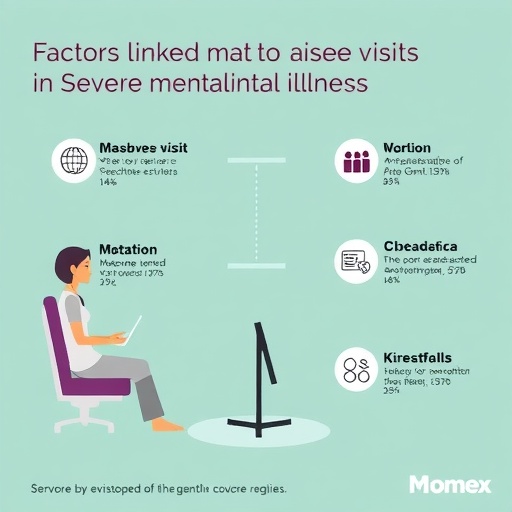In the realm of global mental health, ensuring consistent outpatient attendance remains a formidable challenge, particularly in resource-constrained settings. A groundbreaking study recently conducted in Uganda sheds critical light on the myriad factors driving non-adherence to clinic visits among patients grappling with severe mental illnesses (SMI). This research, embedded within the SMILE study framework, provides robust evidence underscoring the complexity of maintaining engagement with mental health services and highlights pivotal determinants that may inform targeted interventions in similar contexts worldwide.
Non-adherence to scheduled clinic visits presents substantial barriers not only to effective treatment but also to the broader objectives of psychiatric healthcare delivery. Missed appointments disrupt continuity of care, undermine therapeutic alliances, and compromise clinical outcomes. In regions like Uganda, where mental health resources are scarce and sociocultural dynamics often complicate healthcare access, understanding the underlying contributors to non-adherence is essential for optimizing service provision and improving patient prognoses.
The SMILE study’s cohort design involved a systematic sampling of 1,201 outpatient participants diagnosed with severe mental illnesses, drawn from two major referral hospitals: Butabika National Referral Mental Hospital and Masaka Regional Referral Hospital. These institutions represent critical nodes in Uganda’s mental health infrastructure. Data collection spanned multiple domains, including socio-demographic information, psychosocial variables, psychiatric symptomatology, and behavioural risk factors. Adherence was operationally defined as attendance at scheduled clinical follow-ups occurring quarterly over a 12-month period.
Quantitative analyses employed a multilayered approach, utilizing descriptive statistics to outline adherence patterns, followed by bivariate and multivariate logistic regression models to discern significant predictors of non-adherence. This methodological rigor ensured the isolation of factors most strongly associated with patients’ lapses in clinic attendance, generating insights pivotal for both clinical practice and health policy considerations.
The study revealed a non-adherence prevalence rate of 20%, indicating that one in five individuals with severe mental illness failed to consistently attend scheduled outpatient visits. Notably, male patients exhibited higher non-adherence rates (22.9%) relative to their female counterparts (17.6%), suggesting potential gender-based disparities in healthcare engagement. This discrepancy raises imperative questions regarding the socio-cultural and possibly biologic determinants influencing health-seeking behaviours among men within this demographic.
Age emerged as a crucial factor, with younger patients disproportionately represented among those missing appointments. This finding might reflect developmental psychosocial challenges, differing prioritization of mental health needs, or variable perceptions of illness severity among younger cohorts. Additionally, patients attending Butabika National Referral Mental Hospital demonstrated increased odds of non-adherence, possibly attributable to hospital-specific systemic issues, geographic accessibility, or patient load dynamics.
Alcohol consumption was distinctly linked to higher rates of non-adherence, emphasizing the disruptive role substance use plays in the management of severe mental illnesses. The interplay between substance use disorders and psychiatric illness is well-documented, with comorbid substance use complicating treatment adherence through factors such as cognitive impairment, diminished motivation, and social instability.
Conversely, the study identified higher levels of social support as a protective factor enhancing clinic visit adherence. This protective effect underscores the importance of community, familial involvement, and social networks in facilitating treatment engagement among psychiatric populations. Social support may mitigate treatment barriers by providing emotional encouragement, logistical assistance, and reinforcement of illness management behaviours.
Within the spectrum of psychiatric diagnoses, patients suffering from major depressive disorder and those exhibiting severe psychiatric symptoms were notably prone to missing appointments. Severe symptomatology can impair cognitive functions, reduce insight into illness, and diminish motivation, all of which compromise consistent clinic attendance. This relationship between symptom severity and adherence underscores the necessity for integrated care models that not only treat symptoms but also address adherence challenges holistically.
The multifaceted nature of non-adherence as highlighted by this study calls for comprehensive intervention strategies. Tailoring approaches to address socio-demographic disparities, mitigating substance use, bolstering social support mechanisms, and intensively managing psychiatric symptoms could collectively enhance retention in mental health services. Particularly in settings burdened by resource limitations, such targeted interventions may yield significant dividends in patient outcomes and system efficiencies.
Crucially, this investigation informs mental health policy by evidencing the nuanced interrelations between individual, clinical, and institutional factors in adherence behaviours. It advocates for an integrative framework wherein outreach, counseling, psychosocial support, and substance use treatment are interwoven into routine psychiatric care. Digital health innovations and community-based programs might further augment adherence, especially among younger cohorts and those with diminished social networks.
While the findings carry profound implications for Uganda and similar low-resource settings, they also contribute to the global discourse on optimizing mental health service delivery. Understanding patient engagement complexities enhances cross-context generalizability and supports the design of culturally sensitive adherence-enhancing interventions worldwide.
In summary, the SMILE study dissects the challenge of clinic visit non-adherence among patients with severe mental illness in Uganda, elucidating key predictive factors and laying a foundation for future interventional research. By addressing the intertwined socio-demographic and clinical determinants, stakeholders can strive toward improved adherence, ultimately fostering better health trajectories and more sustainable mental health systems.
Subject of Research: Factors influencing non-adherence to scheduled clinic visits among patients with severe mental illness in Uganda.
Article Title: Factors associated with non-adherence to clinic visits among patients with severe mental illness enrolled in the SMILE study in Uganda.
Article References: Mpango, R.S., Ssembajjwe, W., Rukundo, G.Z. et al. Factors associated with non-adherence to clinic visits among patients with severe mental illness enrolled in the SMILE study in Uganda. BMC Psychiatry 25, 734 (2025). https://doi.org/10.1186/s12888-025-07121-7
Image Credits: AI Generated
DOI: https://doi.org/10.1186/s12888-025-07121-7




